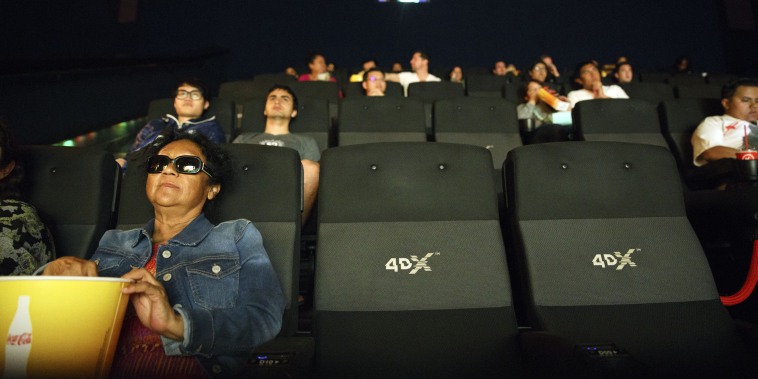
In George Miller’s new Mad Max film “Furiosa,” a red paint flare explodes and casts the theater screen in a saturated crimson cloud.
Feet away, among the rows of gyroscopic 4DX chairs, plumes of fog roll in, catching the red hue from the screen as if the flare somehow transcended the fourth wall and infiltrated the cinema. The fog parts, Chris Hemsworth as Dementus comes into focus and grins at the audience.
This is the 4DX viewing experience. It’s one of many multi-sensory moments programmed for “Furiosa: A Mad Max Saga,” which opened in theaters Friday, in order to immerse audiences in Miller’s latest visit to the vast Wasteland. And it amounts to a key value proposition at a time when cinemas are desperate to lure back moviegoers, particularly those in the younger demographics.
“We make movies different,” said Duncan Macdonald, head of worldwide marketing and theatre development for CJ 4DPlex Americas. “We are so different out there, with our motion capabilities and our environmental effects.”
In the wake of the pandemic, audiences grew used to shorter theatrical windows and having access to more content at home. At the same time, pandemic-related shutdowns and production stalls from two Hollywood strikes greatly limited the amount of content hitting theaters. As a result, consumers fell out of the habit of going to cinemas.
Moviegoers who have returned are seeking premium experiences — higher-quality picture and sound — and are willing to pay more for those tickets. 4DX is one option in the premium large format market alongside the likes of IMAX and Dolby Cinema. CJ 4DPlex also owns the ScreenX format.
“Premium movie theatre experiences are key to the health of the industry and with fewer films in the marketplace on average than in past years, the importance and essential nature of a company like 4DX comes into sharp focus,” said Paul Dergarabedian, senior media analyst at Comscore.
4DX utilizes motion seats, practical effects and sensory elements to immerse viewers in a movie. For Warner Bros.′ “Wonka,” the company piped in the smell of chocolate during screenings.
CJ 4DPlex Americas CEO Don Savant says the experience is “complementary” to routine moviegoing experiences, noting that 4DX cinemas attract younger consumers, predominantly in the 10-to-30 age range, who are seeking more experiential viewing.
For consumers, the 4DX experience costs an average of $8 more than traditional ticket prices, meaning a ticket can range from $20 to $30 each. But the extra cost doesn’t seem to be detering audiences.
Last year, 4DX’s domestic locations tallied $53.4 million in ticket sales.
“Notably, the higher price for premium movie tickets is not a barrier to their success but rather seen as representing a solid value proposition for fans in pursuit of the best possible big screen experience,” Dergarabedian said. “This is good news for theater owners who, facing fewer wide release films in the marketplace, can boost revenues on a per-ticket basis while giving their patrons a great experience that will have them returning to the multiplex more often.”
And, for major blockbuster titles, 4DX is proving to be even more popular. Ticket sales for Disney’s “Avatar: The Way of Water” topped $83.6 million from 4DX screens, or about 3.6% of the film’s total box office haul. It is currently the highest-grossing film for the screen format, Savant said.
“We want to give customers an easy excuse to leave their homes and visit a local Regal theater,” said CEO Eduardo Acuna of Regal Cinemas. “Premium formats like 4DX offer a movie-watching experience that cannot be replicated by any home theater setup. Each premium format serves a different purpose for storytelling, and each increases the enjoyment of watching a movie in a different and immersive way.”
Acuna noted that 4DX auditoriums are “a strong box office performer” for Regal.
Regal is the largest operator of 4DX screens domestically, with 50 of the 62 locations found in the U.S. and Canada. Globally, there are nearly 750 4DX screens with numerous theatrical partners. The highest volume is in Asia and Europe.
Savant said 4DX is adding around 25 to 30 screens per year worldwide, but is looking to push that figure up to 50 to 60 screens a year. The company is seeking to have around 1,200 4DX locations in the next five years. On average, each theater has around 140 seats.
Moviegoers who venture away from their couches and into a 4DX theater to see Warner Bros.′ “Furiosa” will feel from their seat the rev of motorcycles racing through the desert, smell gunpowder in the air during epic gun battles and even get hit with a soft spray of water as it’s flicked in the face of a character on the screen.
Last year, 4DX programmed more than 100 films for the souped-up viewing experience. Around 40 to 45 of those were major Hollywood titles, Savant said. Others included concert content, musical singalongs, anniversary titles and local language films.
Typically, the 4DX programmers, who are based in Seoul, have two to three weeks to craft the motion and special effects, although Savant said they can turn around a film in a week if the need arises. 4DX can program three titles at a time.
Both Macdonald and Savant referred to 4DX’s programmers as “artists,” describing the process — from the subwoofers in the seats to the fog machines — as different brushstrokes in a work of art.
“Every film is different,” said Macdonald. “So we look at the nuances of the different films that we have and how those are programmed.”
In some cases filmmakers will get involved, offering suggestions for when certain effects should be used and how subtle or bombastic they should feel or look.
“It’s the most dynamic way to see [a film],” Savant said.
